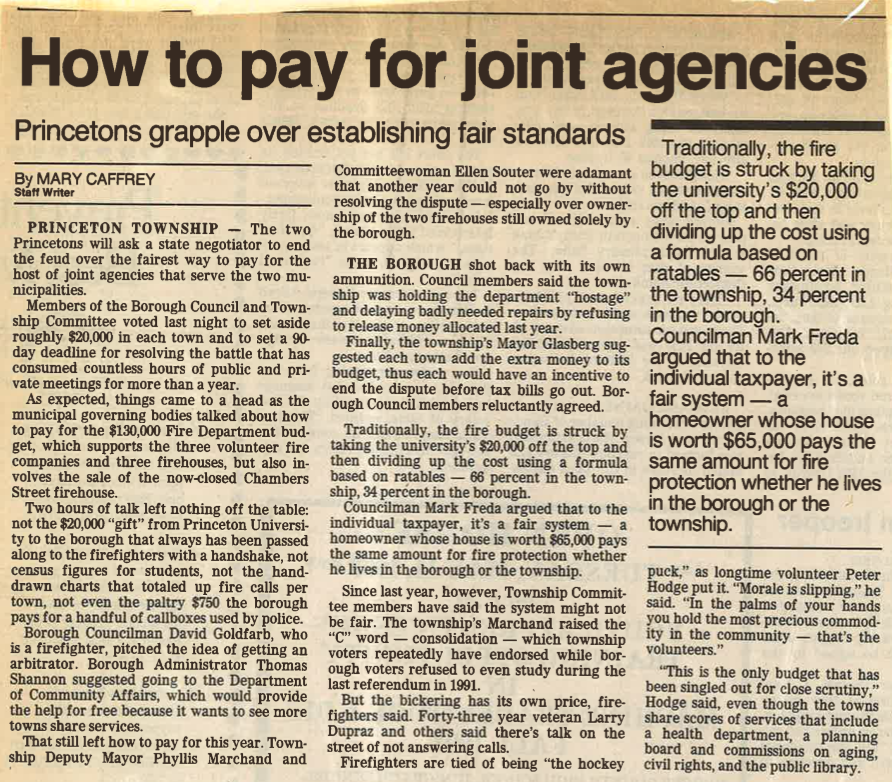
May 3, 1993 (~estimated)
How to pay for joint agencies
By Mary Caffrey
Staff Writer
PRINCETON TOWNSHIP — The two Princetons will ask a state negotiator to end the feud over the fairest way to pay for the host of joint agencies that serve the two municipalities.
Members of the Borough Council and Township Committee voted last night to set aside roughly $20,000 in each town and to set a 90-day deadline for resolving the battle that has consumed countless hours of public and private meetings for more than a year.
As expected, things came to a head as the municipal governing bodies talked about how to pay for the $130,000 Fire Department budget, which supports the three volunteer fire companies and three firehouses, but also involves the sale of the now-closed Chambers Street firehouse.
Two hours of talk left nothing off the table: not the $20,000 “gift” from Princeton University to the borough that always has been passed along to the firefighters with a handshake, not census figures for students, not the hand-drawn charts that totaled up fire calls per town, not even the paltry $750 the borough pays for a handful of callboxes used by police.
Borough Councilman David Goldfarb, who is a firefighter, pitched the idea of getting an arbitrator. Borough Administrator Thomas Shannon suggested going to the Department of Community Affairs, which would provide the help for free because it wants to see more towns share services.
That still left how to pay for this year. Town-ship Deputy Mayor Phyllis Marchand and Committeewoman Ellen Souter were adamant that another year could not go by without resolving the dispute — especially over ownership of the two firehouses still owned solely by the borough.
THE BOROUGH shot back with its own ammunition. Council members said the township was holding the department “hostage” and delaying badly needed repairs by refusing to release money allocated last year.
Finally, the township’s Mayor Ginsberg suggested each town add the extra money to its budget, thus each would have an incentive to end the dispute before tax bills go out. Bor-ough Council members reluctantly agreed.
Traditionally, the fire budget is struck by taking the university’s 820,000 off the top and then dividing up the cost using a formula based on ratables — 66 percent in the town-ship, 34 percent in the borough.
Councilman Mark Freda argued that to the individual taxpayer, it’s a fair system — a homeowner whose house is worth $65,000 pays the same amount for fire protection whether he lives in the borough or the township.
Since last year, however, Township Committee members have said the system might not be fair. The township’s Marchand raised the “C” word — consolidation — which township voters repeatedly have endorsed while bor-ough voters refused to even study during the last referendum in 1991.
But the bickering has its own price, fire-fighters said. Forty-three year veteran Larry Dupraz and others said there’s talk on the street of not answering calls.
Firefighters are tied of being “the hockey puck,” as longtime volunteer Peter Hodge put it. “Morale is slipping,” he said. “In the palms of your hands you hold the most precious commodity in the community — that’s the volunteers.”
“This is the only budget that has been singled out for close scrutiny,” Hodge said, even though the towns share scores of services that include a health department, a planning board and commissions on aging, civil rights, and the public library.